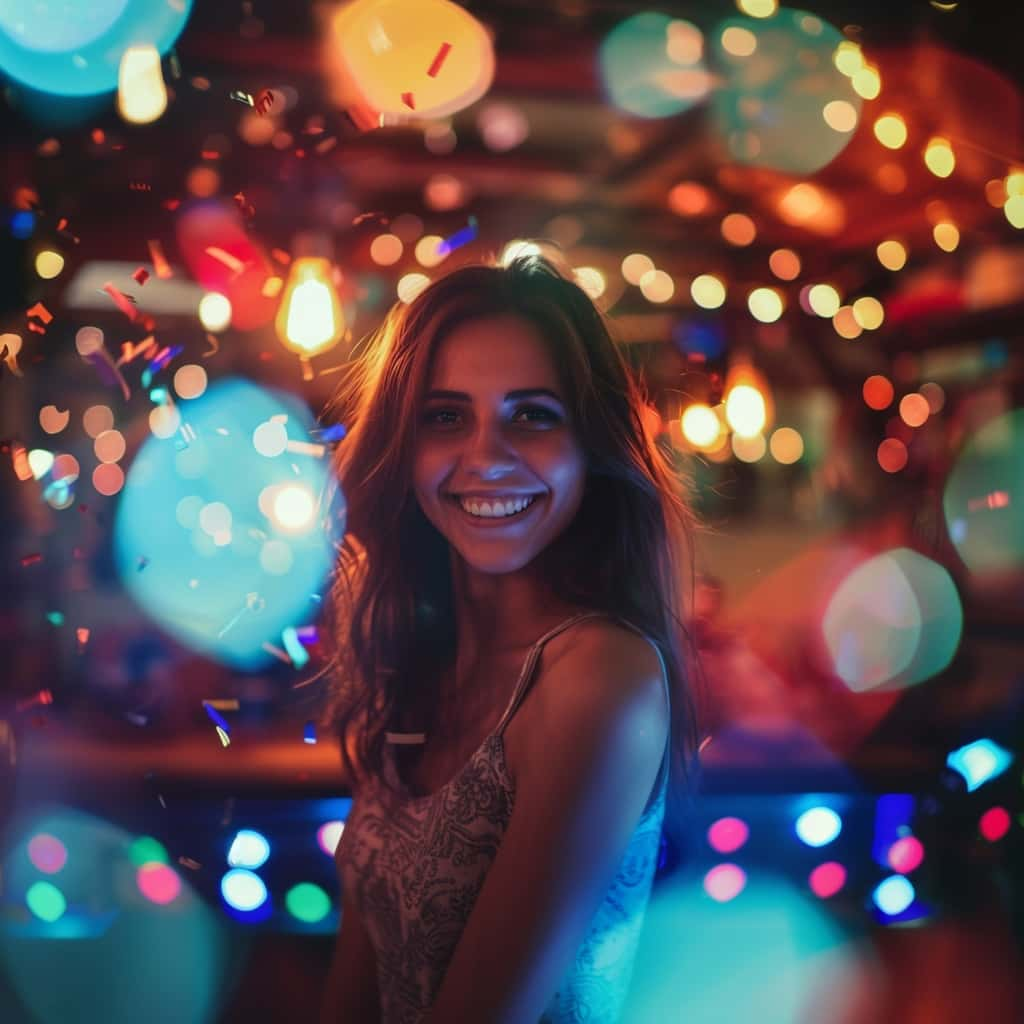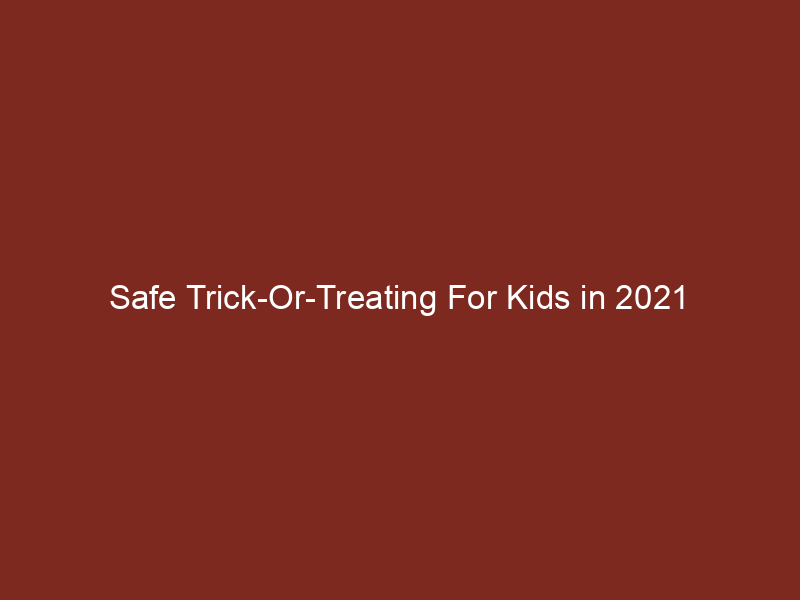Halloween
Should Halloween Be Banned Due to Its Dark History?
Wander through the dark origins of Halloween to uncover how this spooky holiday has transformed into a modern celebration.

Halloween shouldn't be banned due to its dark history. While it traces back to Celtic traditions with themes of the supernatural and mischief, modern celebrations focus more on costumes and candy. The holiday has evolved into a fun, community-centered event. Embracing the spirit of Halloween today doesn't necessarily mean endorsing its past. There's much more to discover about how this holiday has transformed over time.
Key Takeaways
- Halloween's dark history involves mischief, mayhem, and pagan rituals.
- Some religious groups associate Halloween with darkness and occult practices.
- Commercialization has transformed Halloween into a consumer-driven holiday.
- Excessive candy consumption during Halloween impacts health and well-being.
- Reform efforts suggest community events and responsible behavior to shift focus.
The Dark History of Halloween
The dark history of Halloween traces back to ancient Celtic traditions, particularly the festival of Samhain marking the end of the harvest season. During this time, the Celts believed that the barrier between the living and the dead was at its thinnest, allowing spirits to roam freely. To ward off these spirits, people would light bonfires and wear costumes. However, these traditions also involved more mischievous activities like pranks.
In Scotland and Ireland, Halloween was a time for pranks, mischief, and scaring people. The focus wasn't on candy and costumes as it's today; instead, it revolved around creating mayhem and embracing the supernatural. These roots in mischief and the supernatural have contributed to Halloween's spooky reputation over time.
The historical traditions surrounding Halloween have sparked debates about its appropriateness, with some even considering banning the holiday. Understanding these darker origins sheds light on why Halloween has evolved into the celebration as it's perceived today.
Commercialization of the Holiday
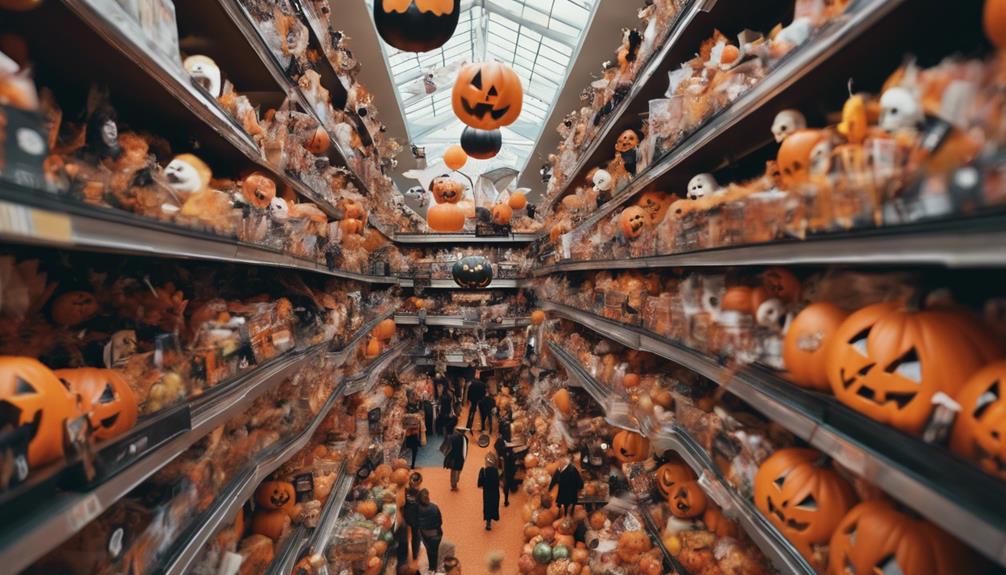
As Halloween's historical roots in mischief and the supernatural evolved over time, the holiday underwent a significant transformation with the rise of commercialization in the mid-19th century. The production of costumes, decorations, and candy marked the beginning of Halloween's commercialization. Trick-or-treating, which became a popular activity during the holiday, further fueled its commercial success. Today, Halloween-related goods generate over $8 billion in sales annually in the United States, making it a highly profitable holiday. Costume parties, haunted houses, and Halloween-themed entertainment have become significant aspects of the celebration, contributing to the commercialization trend.
| Commercialization of Halloween | ||
|---|---|---|
| Costumes | Decorations | Candy |
Stress and Anxiety of Halloween
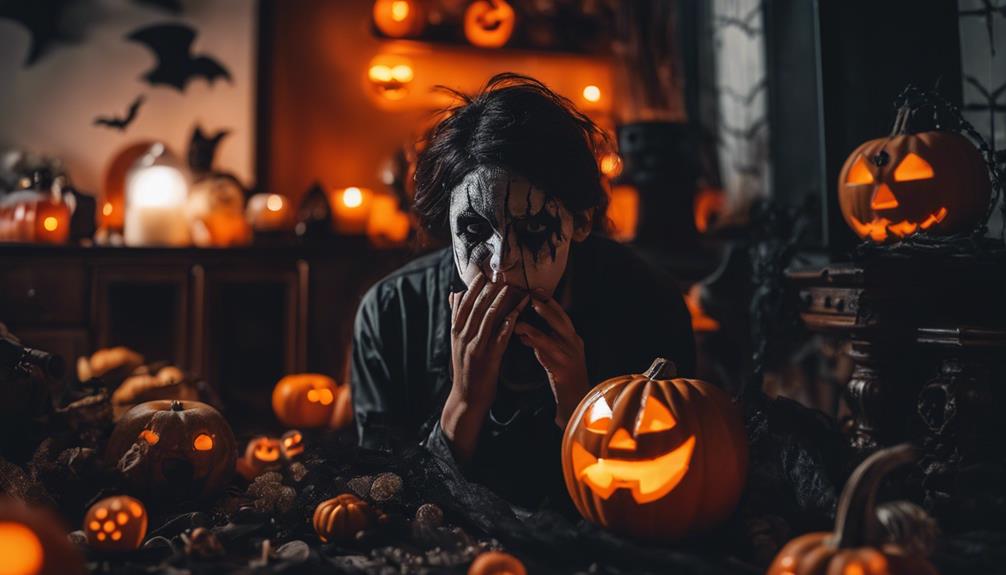
Juggling the demands of work, dinner, and trick-or-treating with your children during Halloween can pose a significant source of stress and anxiety for many parents. Additionally, the pressure to participate in trick-or-treating and deal with the nuisance it brings can be overwhelming for homeowners. Here are some key stressors related to Halloween:
- Balancing Act: Finding the time and energy to manage work responsibilities, prepare dinner, and accompany your children for trick-or-treating can be a challenging task, leading to increased stress levels.
- Home Front Pressure: The expectation to decorate your porch, participate in trick-or-treating, and handle the disruptions caused by Halloween activities can add to the stress experienced by homeowners during this holiday.
- Intrusive Nature: Some individuals perceive Halloween as intrusive and annoying, further contributing to the overall stress and anxiety associated with the holiday.
Navigating these stressors, along with the commercialization of Halloween focusing heavily on candy and costumes, can create a challenging and tense environment for many individuals during this time of year.
Roots in Paganism and Satanism
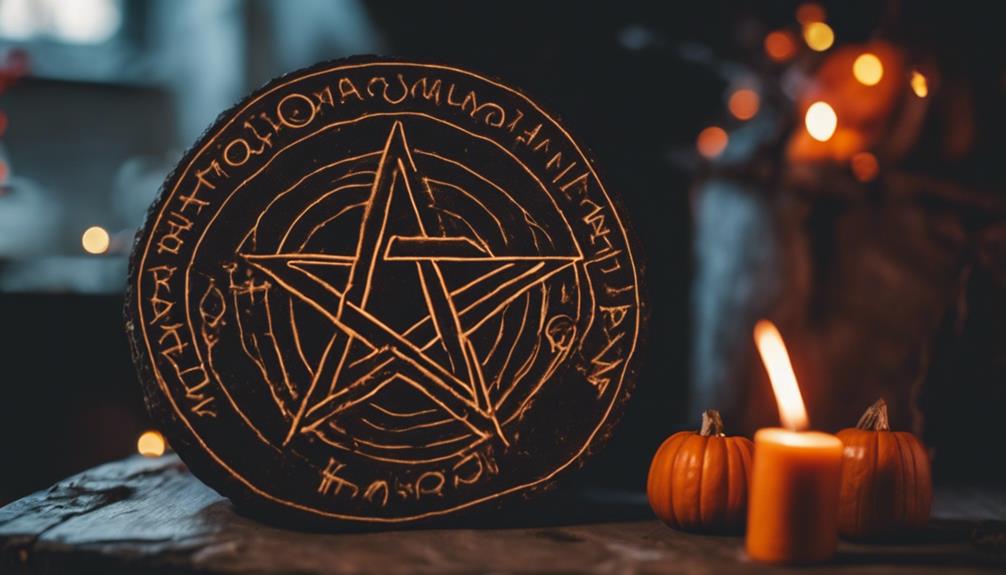
Exploring the ancient origins of Halloween reveals its deep connections to pagan rituals and beliefs, shedding light on its controversial associations with darkness and occult practices. Halloween traces back to the Celtic festival of Samhain, where the Celts believed that during this time, the barrier between the living and the dead was porous, allowing spirits to walk among the living.
These pagan roots have led to some religious groups associating Halloween with practices that they consider to be linked to paganism, darkness, and even Satanism. Symbols and traditions of Halloween such as costumes, bonfires, and jack-o'-lanterns can all be tied back to ancient pagan rituals and beliefs.
The historical connection between Halloween and pagan or occult practices has sparked debates about the holiday's appropriateness. Understanding these origins can provide insight into why Halloween has such controversial connotations and is sometimes viewed with suspicion by certain groups.
The True Purpose of Halloween Lost
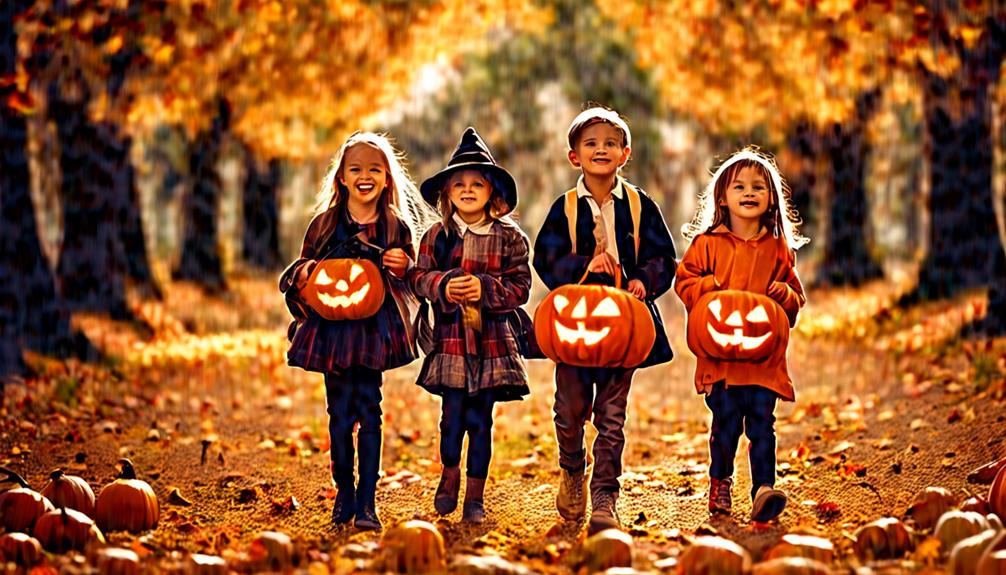
The original intention behind Halloween, centered on warding off spirits and honoring the dead, has been overshadowed by modern commercialization and candy-focused celebrations. Unfortunately, the true essence of this ancient tradition has been diluted by the following:
- Commercialization: Halloween has become a highly commercialized holiday, with stores pushing for the sale of costumes, decorations, and candy, shifting the focus away from its original purpose.
- Loss of Spiritual Meaning: The spiritual significance of Halloween, originating from the Celtic festival of Samhain, has been largely forgotten in favor of superficial festivities.
- Disconnect from Cultural Roots: Many people partake in Halloween without understanding its historical and cultural significance, contributing to the loss of connection with the holiday's roots.
The evolution of Halloween into a commercialized event has obscured its original purpose, turning it into a consumer-driven holiday devoid of its deeper spiritual and cultural meanings.
Negative Impact on Children's Health
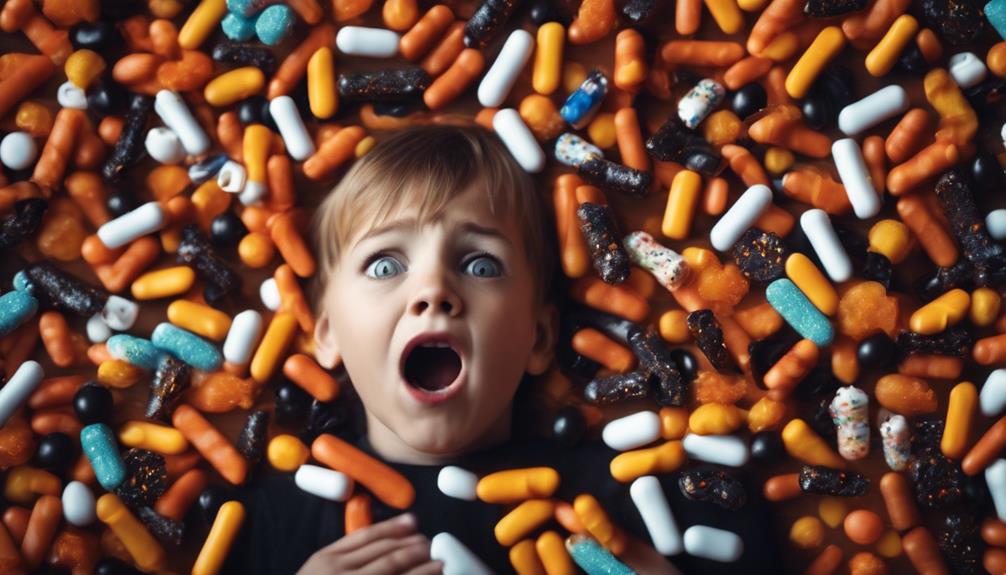
Children's health can suffer negative consequences as a result of the excessive consumption of sugary treats and candies during Halloween festivities. The high intake of sweets can lead to weight gain and increase the risk of obesity in children.
Halloween treats often contain high levels of sugar, which can result in dental issues like cavities and tooth decay. Consuming large amounts of sugary foods during Halloween can also disrupt children's energy levels and concentration, impacting their overall health and well-being.
It's essential for parents to be mindful of these potential negative effects and encourage moderation in treat consumption to safeguard their children's health. By monitoring the amount of sugary treats consumed during Halloween, parents can help prevent the health issues associated with excessive sugar intake, ensuring that their children enjoy the holiday in a way that's both fun and healthy.
The Holiday's Effect on Homeowners

Having your property littered with decorations, dealing with safety concerns during trick-or-treating, and the potential decrease in property value are all valid points to take into account when discussing Halloween's effect on homeowners.
It's important to be mindful of how the holiday impacts those who may not wish to partake in its festivities or face challenges as a result.
From concerns about property damage to the stress of managing increased foot traffic, Halloween can present various challenges for homeowners to navigate.
Property Value Decrease
Considering the potential for property devaluation during Halloween due to mischief and vandalism, homeowners must be aware of the holiday's impact on their investment. Halloween mischief can have lasting effects on property values, affecting homeowners in various ways:
- Decrease in Desirability: Properties in neighborhoods known for Halloween disturbances may be viewed less favorably by potential buyers, leading to a decrease in demand and property values.
- Challenges in Selling: Homeowners in areas with a history of Halloween-related problems may encounter difficulties when trying to sell their homes, as the holiday's negative reputation can deter buyers.
- Financial Burden: Increased insurance costs due to the risks associated with Halloween vandalism can place a financial burden on homeowners, especially in areas prone to such incidents.
Being mindful of these potential impacts can help homeowners make informed decisions and take necessary precautions to protect their investments during the Halloween season.
Trick-or-Treat Safety Concerns
Amidst the concerns over property value decrease during Halloween, homeowners also grapple with trick-or-treat safety worries that impact their experience during the holiday.
Some homeowners find trick-or-treating to be a nuisance, as they may not want to participate in the Halloween tradition. The pressure to engage in trick-or-treating can cause stress and anxiety for homeowners.
Safety concerns about the well-being of trick-or-treaters in the neighborhood are also prevalent. The influx of trick-or-treaters can disrupt the usual routine of homeowners and create a sense of intrusion.
Additionally, homeowners may worry about potential property damage or disturbances caused by Halloween activities. Balancing the desire to participate in the festivities with concerns about safety and property can be a challenge for homeowners during Halloween.
Being mindful of these trick-or-treat safety concerns is essential for creating a positive experience for both homeowners and trick-or-treaters.
Decorations Causing Litter
Halloween decorations left behind after the holiday festivities can pose a litter issue for homeowners in neighborhoods. When it comes to Halloween decorations, some key points to ponder are:
- Contributing Factors: Halloween decorations, such as fake spider webs and plastic pumpkins, can easily add to the litter in neighborhoods.
- Cleanup Challenges: Homeowners may find decorations like discarded candy wrappers, broken props, and deflated inflatables left behind after Halloween, making the cleanup process post-Halloween time-consuming and frustrating.
- Aesthetic and Environmental Impact: The accumulation of Halloween-related litter, including broken plastic skeletons and tombstones, not only detracts from the aesthetic appeal of neighborhoods but also raises environmental concerns.
As homeowners deal with the aftermath of Halloween, the presence of these decorations can't only create a visual nuisance but also add to the workload of maintaining a clean environment.
Is Reform Possible for Halloween

Reforming Halloween involves addressing its dark history of mischief and vandalism by implementing community events and organized activities to shift the focus towards positive celebrations. By fostering community spirit through inclusive and engaging events, Halloween can be transformed into a festive occasion that promotes creativity and togetherness.
Education and awareness campaigns play an important role in promoting responsible behavior during Halloween, emphasizing the importance of respect and consideration for others. Encouraging neighborhood involvement and supervision can create a safer and more enjoyable experience for all participants, ensuring that the festivities are conducted in a respectful manner.
Emphasizing themes of inclusivity and creativity can further enhance the celebration, allowing individuals to express themselves while fostering a sense of unity within the community. Through a collective effort to promote positive values and behaviors, Halloween can undergo a meaningful reform that celebrates the spirit of community and camaraderie.
Frequently Asked Questions
Is Halloween Dark History?
Yes, Halloween has a dark history. Its origins are linked to ancient Celtic traditions involving the living and the dead.
The holiday includes customs like wearing costumes and lighting bonfires to ward off spirits. Early celebrations also featured pranks and mischief.
Halloween's history encompasses a mix of superstition, mayhem, and cultural evolution. The holiday's dark past reflects a blend of Celtic rituals, Christian influences, and evolving practices related to death and the afterlife.
Why Do Christians Not Agree With Halloween?
When you wonder why Christians disagree with Halloween, their concerns often stem from the holiday's historical ties to pagan rituals and the supernatural.
Many Christians feel that participating in Halloween activities contradicts their religious beliefs due to associations with spirits, witchcraft, and darkness. This leads some to opt for alternative celebrations like harvest festivals or church events.
Perspectives within the Christian community vary widely, with some embracing Halloween and others choosing to abstain.
Why Is Halloween Controversial?
Halloween stirs controversy due to its historical roots in dark themes and supernatural beliefs. The holiday's origins in pranks and associations with spirits spark debates about its cultural significance.
Some view it as a time to blur the lines between the living and the dead, while others raise concerns about its themes of death and fear. These differing perspectives fuel ongoing discussions about the appropriateness and impact of Halloween celebrations.
What Is the True Story Behind Halloween?
Halloween's true origin lies in the ancient Celtic festival of Samhain, a time when the boundary between the living and the dead was thought to blur. Costumes and bonfires were used to ward off spirits during this festival.
Initially focused on mischief and mayhem, the modern Halloween evolved with added elements like candy and costumes.
Celebrated on November 1, known as All Saints' Day, Halloween has a rich history rooted in ancient traditions.
Conclusion
To sum up, the dark history and negative impact of Halloween raise valid concerns about its future. As we reflect on the origins and consequences of this holiday, one can't help but wonder if it's time for a change.
Will society continue to embrace the commercialization and stress of Halloween, or will there be a shift towards a more meaningful and positive celebration? Only time will tell.
Stay tuned for updates on the fate of this controversial holiday.
Introducing James, our technical guru at Halloween Product Reviews. James ensures that our platform runs smoothly so that your experience browsing our resources is seamless. A Halloween enthusiast himself, James loves to experiment with DIY decoration projects and tech-enhanced costumes. His reviews are packed with practical tips to help you incorporate technology into your Halloween celebrations, making them more thrilling than ever.
Halloween
Is Halloween Oreos Vegan?
Pondering the vegan status of Halloween Oreos? Unveil the answer to their plant-based suitability in this insightful summary!
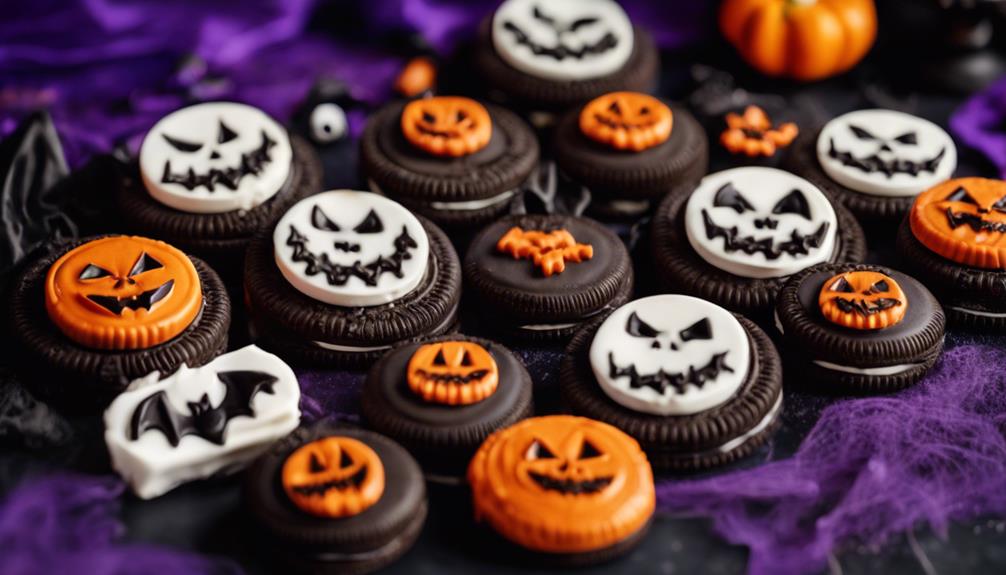
Halloween Oreos are vegan-friendly. They lack animal-derived ingredients like milk or eggs, aligning with the standard Oreo recipe but with a fun twist. Always check the ingredient list for non-vegan components such as milk powder or gelatin. Seasonal variations may introduce unique ingredients, so it's wise to double-check for changes in vegan suitability. Palm oil is used in Oreos but can be from sustainable sources. Some vegans may avoid it due to environmental concerns. Gluten-free considerations are important for vegan options, like Halloween Oreos. Embrace themed Oreos for a festive treat.
Key Takeaways
- Halloween Oreos are usually vegan due to the absence of animal-derived ingredients like milk or eggs.
- Check the ingredient list for non-vegan components such as milk powder or gelatin.
- Seasonal variations may introduce unique ingredients, impacting vegan status.
- Palm oil in Oreos raises environmental concerns; some vegans avoid it.
- Gluten-free considerations are essential for vegans; some Oreo options contain gluten.
Halloween Oreos Ingredients
When looking at the ingredients of Halloween Oreos, you'll find a familiar vegan-friendly lineup similar to classic Oreos. These spooky treats typically contain ingredients like unbleached enriched flour, cocoa, high fructose corn syrup, and artificial flavors.
What makes Halloween Oreos appealing to vegans is their lack of animal-derived ingredients, aligning with the standard Oreo recipe. You should scan the packaging and ingredient list of Halloween Oreos to make sure they meet your specific vegan criteria.
Despite any unique shapes or packaging for seasonal Oreo flavors like Halloween Oreos, the core ingredients usually remain vegan-friendly. By checking the ingredient list, you can confidently enjoy these festive treats knowing they fit within your dietary preferences.
Vegan Status of Halloween Oreos
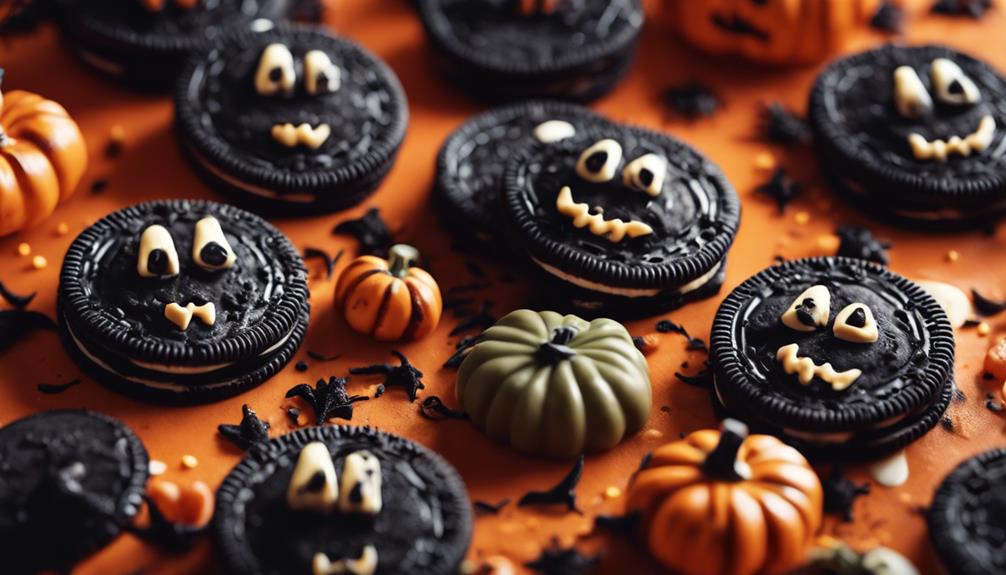
Indulge in the vegan-friendly goodness of Halloween Oreos, which typically align with the standard Oreo recipe by omitting animal-derived ingredients. Halloween Oreos, like their classic counterpart, don't contain milk, eggs, or other non-vegan components.
These festive treats are often a fun twist on the classic Oreo cookie, perfect for enjoying while following a vegan diet. When checking the ingredients list, make sure to scan for any potential non-vegan components such as milk powder or gelatin.
Checking for Non-Vegan Components

To make sure that Halloween Oreos align with your vegan lifestyle, carefully inspect the ingredients list for any potential non-vegan components like milk powder or gelatin.
When checking for non-vegan ingredients in Halloween Oreos, keep an eye out for the following:
- Dairy Derivatives: Some varieties of Halloween Oreos may contain milk powder, whey, lactose, or other dairy derivatives, which aren't vegan-friendly.
- Gelatin: Gelatin, a common non-vegan ingredient derived from animal collagen, can be present in specific flavors of Halloween Oreos. It's important to watch out for this component.
- Verify Ingredients: Always verify the ingredients of Halloween Oreos before consuming them to make certain they meet your vegan requirements. Ingredients can vary between different flavors and seasonal variations, so it's essential to double-check each time you purchase a new pack.
Seasonal Variations and Ingredients
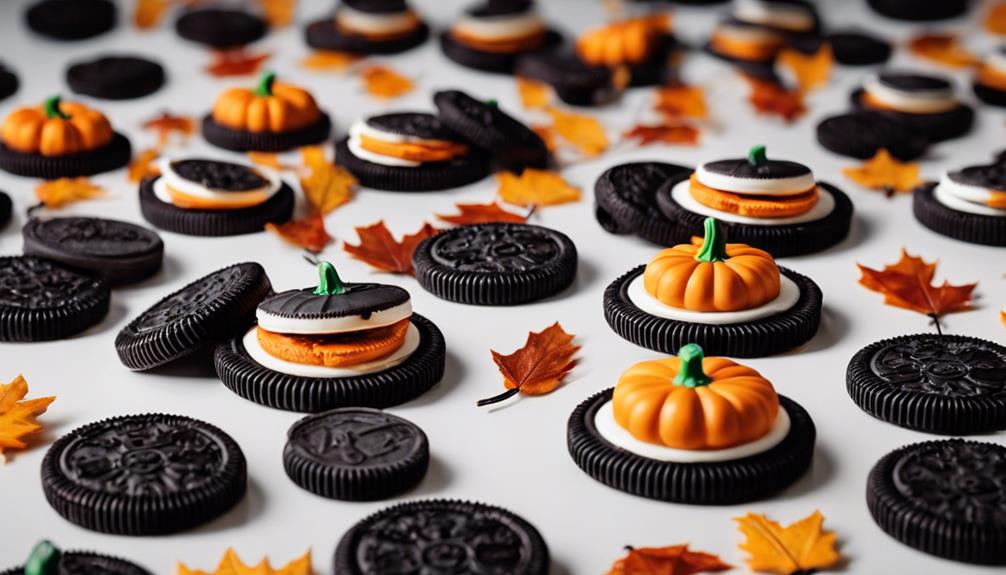
Halloween Oreos, like other seasonal variations, often introduce unique ingredients or designs to align with the theme. These changes can impact the vegan status of the product, so examining the ingredients list is important.
Be aware that seasonal Oreo flavors are temporary, so it's vital to check for any alterations in the ingredients that might affect their vegan suitability.
Seasonal Availability
During the Halloween season, be aware that the ingredients in Halloween Oreos may differ slightly from the traditional Oreo recipe due to their festive theme. When it comes to seasonal availability, here are a few key points to keep in mind:
- Seasonal Flavors: Halloween Oreos, also known as 'Halloween Orange Boo,' boast a unique orange-colored creme filling that adds a festive touch to the classic Oreo cookie.
- Festive Theme: These special Oreos feature Halloween-themed designs on the cookies, making them a fun and spooky treat to enjoy during the Halloween season.
- Available During Halloween Season: Halloween Oreos are typically released and available for purchase around the Halloween season, making them a limited-edition offering for Oreo fans to enjoy.
When looking to indulge in Halloween Oreos, be sure to check the packaging for any specific ingredient information or seasonal variations that may be present in these Halloween-themed treats.
Ingredient Analysis
When examining the ingredients of Halloween Oreos, consider how seasonal variations may impact their vegan status. Halloween Oreos are generally vegan-friendly, much like the classic Oreos. The ingredients in Halloween Oreos closely resemble those in regular Oreos, making them suitable for vegans.
Despite potential festive designs or color variations for the Halloween season, these cookies typically don't contain non-vegan ingredients. Seasonal variations of Oreos often maintain the vegan status of the original cookies, providing a familiar treat for those following a plant-based diet.
To verify that Halloween Oreos are vegan-friendly, it's advisable to check the ingredient list, as recipes may vary slightly. By reviewing the ingredients, you can confirm whether Halloween Oreos align with your dietary preferences and enjoy the spooky season without compromising your plant-based lifestyle.
Vegan-Friendly Oreo Alternatives
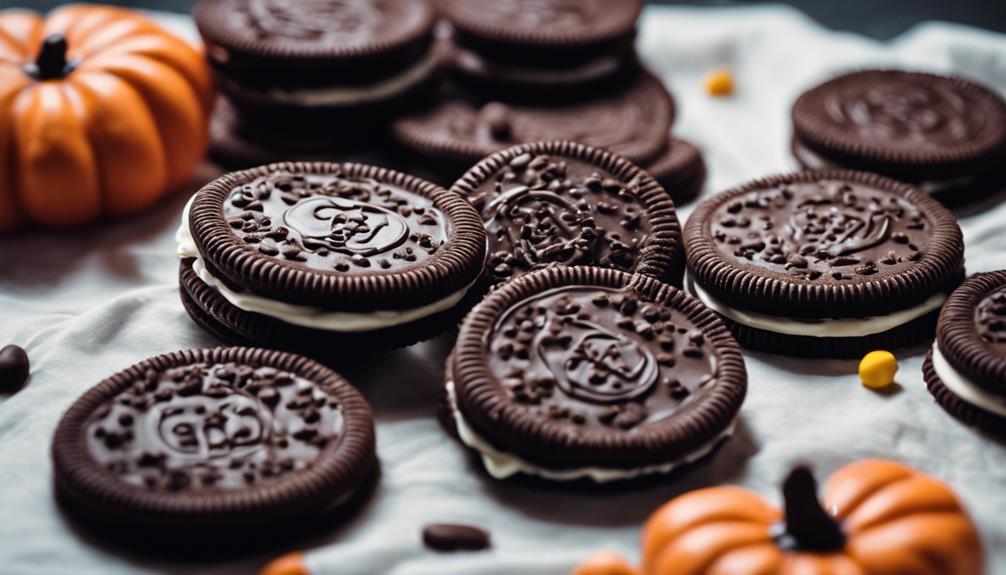
Looking for vegan alternatives to Oreo cookies?
You can explore various vegan Oreo brands, experiment with homemade Oreo recipes, or try out specialty vegan cookies for a unique twist on this classic treat.
Whether you prefer the traditional Oreo flavors or want to venture into new vegan options, there are plenty of choices to satisfy your sweet cravings.
Make sure to verify the ingredients to confirm your Oreo alternatives align with your dietary preferences.
Vegan Oreo Brands
When selecting vegan Oreo brands, it's crucial to keep in mind that Peanut Butter Oreos are the only non-vegan option due to containing milk. Additionally, in some countries, Oreos may not be suitable for vegans because the sugar used in them is processed with bone char.
It's important to carefully review the ingredients list to identify any potential non-vegan components in Oreo products. If you're searching for alternatives, options like Bakery Cookies N Cream and GATO Cookie n Cream Chocolate Vanilla are available, offering similar flavors and textures without compromising your vegan lifestyle.
Homemade Oreo Recipes
Explore how homemade Oreo recipes offer a delightful twist on the classic cookie, providing vegan-friendly alternatives filled with delicious plant-based ingredients. These cookies cater to individual dietary preferences and allergens, allowing for a customizable baking experience.
By using plant-based ingredients, such as dairy-free butter and non-dairy milk, you can achieve the iconic Oreo flavors and textures without animal products. Adjusting sweetness levels with natural sweeteners like maple syrup or coconut sugar adds a personal touch to your homemade Oreos.
Experimenting with different fillings and cookie textures can elevate this baking project, making it a fun and rewarding experience. Vegan Oreo recipes not only satisfy your sweet tooth but also open up a world of creative possibilities in the realm of plant-based treats.
Specialty Vegan Cookies
For those seeking delectable plant-based alternatives to the classic Oreo cookie, specialty vegan options like Vegan Bakery Cookies N Cream and GATO Cookie n Cream Chocolate Vanilla present enticing choices.
- Vegan-friendly and cruelty-free, these specialty cookies offer ethical choices for individuals embracing a vegan lifestyle.
- Available at online vegan supermarkets and high street stores, these plant-based options cater to the growing demand for vegan cookies.
- Gluten-free variations like Vegan Bakery Cookies N Cream provide inclusive alternatives for those with dietary restrictions or preferences.
Vegan companies specialize in crafting these delectable treats, ensuring that individuals looking for ethical and health-conscious cookie choices have a wide array of options. Whether you're exploring new flavors or seeking familiar favorites in a vegan-friendly form, these specialty vegan cookies are a delicious way to enjoy a sweet treat while staying true to your values.
Don't forget to check out vegan Oreo recipes to create your own homemade, cruelty-free chocolate sandwich cookies.
Impact of Palm Oil in Oreos
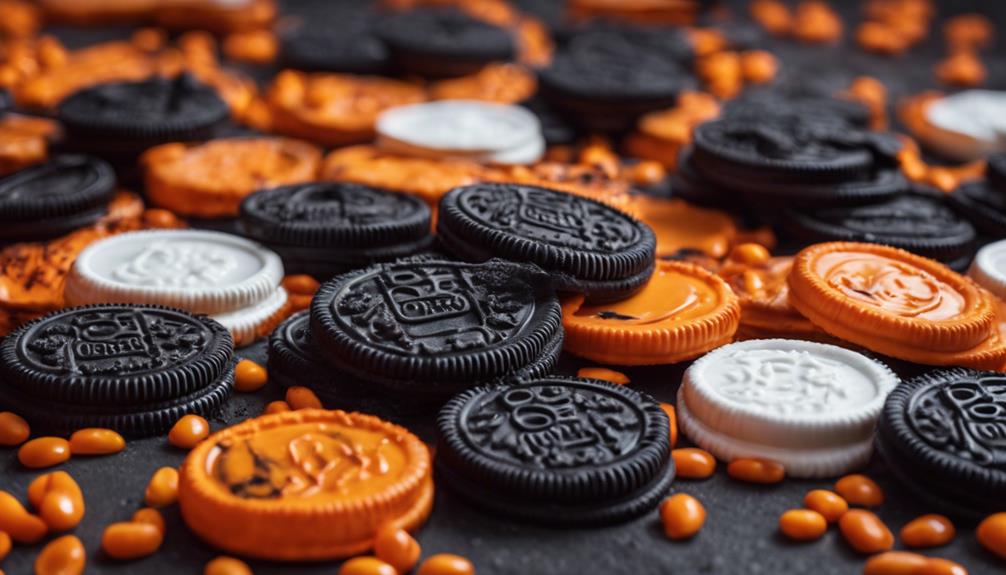
The utilization of palm oil in Oreos plays an important role in their texture and flavor profile. While palm oil is a key ingredient in Oreos, its production has raised environmental concerns due to issues such as deforestation and habitat destruction.
Sustainable palm oil certifications have been introduced to address these concerns by promoting responsible sourcing practices. Some vegans may choose to avoid products containing palm oil to align with their commitment to sustainability. By checking for certifications that guarantee sustainable sourcing practices, consumers can make informed choices about the products they purchase.
It's essential to be aware of the impact of palm oil production on the environment and wildlife, as well as the efforts being made to mitigate these effects through responsible sourcing. Taking these factors into consideration can help individuals support more sustainable practices in the food industry.
Gluten-Free Considerations for Vegans
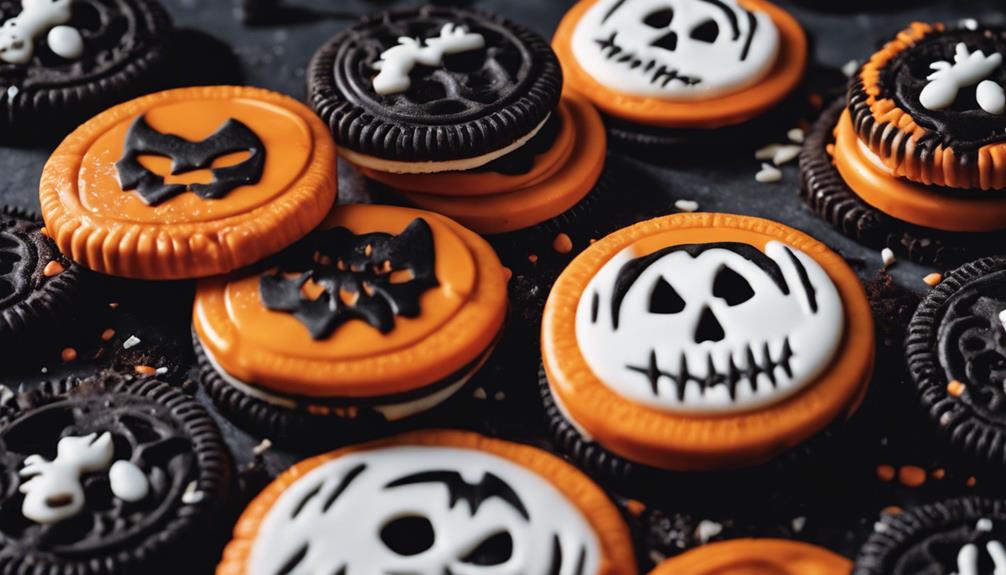
Considering dietary restrictions, incorporating gluten-free options into your vegan lifestyle can enhance your culinary experience and support your health goals. When looking for gluten-free alternatives to traditional Oreo-style cookies, checking the ingredients for gluten-containing additives is crucial. Here are three key points to keep in mind:
- Vegan Options: Some Oreos, including Halloween Oreos, are accidentally vegan, making them suitable for vegans. While not specifically marketed as gluten-free, these cookies may contain ingredients like enriched flour that don't include gluten.
- Specialized Options: Vegan and gluten-free alternatives like Bakery Cookies 'N Cream cater to specific dietary needs, providing a delicious option for those with gluten restrictions. These specialized cookies offer a tasty alternative for individuals looking to enjoy Oreo-style treats without gluten.
- Oat Flour Varieties: Oreo-style cookies made with oat flour can be a great gluten-free option for those with dietary restrictions. Oat flour provides a gluten-free alternative while still delivering the classic taste and texture you love.
Halloween Oreos Ingredient List
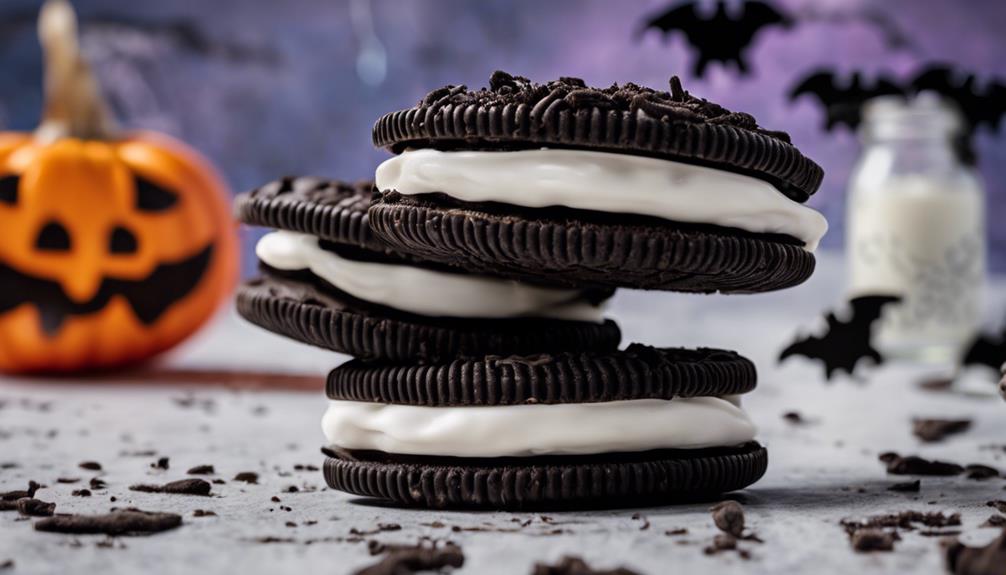
When exploring the ingredient list of Halloween Oreos, be mindful of their composition to make sure they align with your dietary preferences and restrictions. Halloween Oreos are typically accidentally vegan, sharing the same ingredients as regular Oreos. These festive treats feature orange-colored creme filling sandwiched between two chocolate wafers, perfect for the spooky season.
Sometimes, Halloween Oreos may come in special packaging or limited edition designs to add to the holiday spirit. Many people enjoy these Oreos during Halloween for their fun and festive appearance. It's crucial for consumers to always check the ingredient list to make certain there are no changes or variations that mightn't align with their dietary choices. By being aware of what goes into these limited edition treats, you can enjoy the Halloween spirit without compromising your dietary needs.
Special Editions and Vegan Awareness
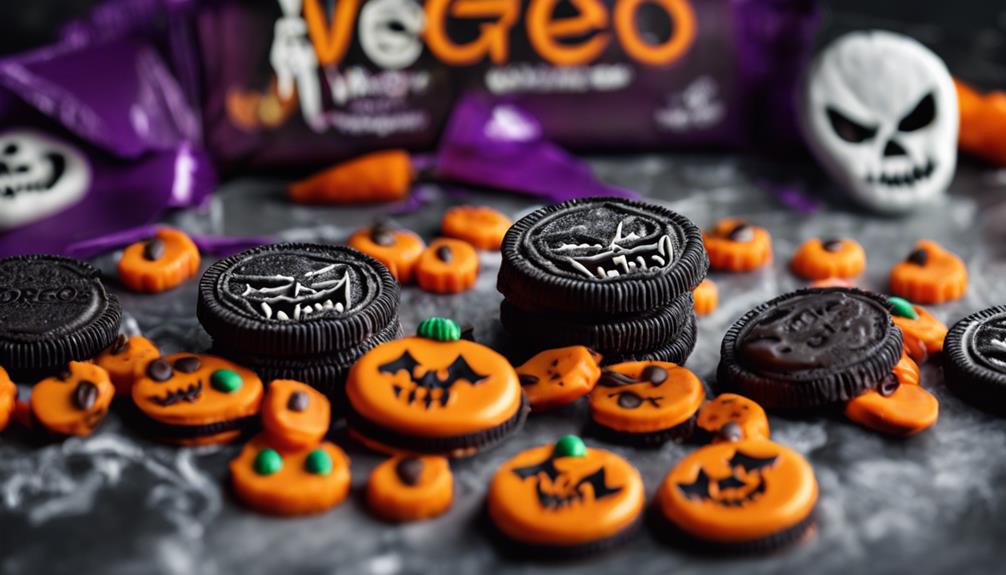
During the Halloween season, vegan consumers can delight in the special edition Halloween Oreos featuring orange-colored creme filling and spooky designs on the cookies. These special editions of Oreos are a festive treat that adds a fun twist to the classic cookie.
Here are three key points to ponder regarding Halloween Oreos and vegan awareness:
- Accidentally Vegan: While Halloween Oreos aren't explicitly marketed as vegan, they don't contain any animal-derived ingredients, making them suitable for vegans to enjoy.
- Core Components: Despite the seasonal variations in color and design, the core components of Halloween Oreos remain consistent with the original recipe, ensuring that they maintain their accidentally vegan status.
- Festive Treat: Vegan consumers can indulge in the Halloween spirit by treating themselves to these themed Oreos during the Halloween season, knowing that they align with their dietary preferences.
Frequently Asked Questions
Which Oreo Flavors Are Vegan?
When it comes to Oreo flavors, several options are vegan-friendly, such as Classic, Double Stuf, Mega Stuf, Golden, Thins, Peanut Butter Creme, Java Chip, and Chocolate Creme.
Checking the ingredients list is essential to avoid non-vegan components like eggs, milk powder, lactose, whey, carmine, and gelatin. Always confirm the ingredients match your dietary preferences.
Remember that some flavors may vary in vegan status by country, so verification based on location is important.
Are Halloween Oreos Different From Regular Oreos?
Halloween Oreos differ from regular Oreos mainly in their festive designs and limited availability.
While the flavor remains consistent, the seasonal packaging and spooky decorations make these cookies a fun treat during the Halloween period.
Keep an eye out for these special Oreos to add a touch of seasonal spirit to your snacking experience.
Are Oreos Actually Vegan?
Oreos are accidentally vegan, not intentionally formulated for vegans. They lack milk, eggs, or other animal-derived ingredients. However, cross-contamination is possible during production in facilities handling animal products.
Some vegans consider broader animal welfare implications beyond ingredient lists. It's advised to check for allergen information to gauge potential cross-contamination risks.
Are Holiday Oreos Vegan?
If you're wondering about holiday Oreos' vegan status, rest assured that Halloween Oreos typically align with vegan preferences.
This spooky twist on the classic treat often features a creme filling free from animal-derived products like milk or eggs.
Always double-check the ingredient list to confirm the vegan-friendly nature of these seasonal Oreo varieties.
Enjoy the festive flavors without compromising your dietary choices!
Conclusion
To sum up, while Halloween Oreos may not be vegan due to the presence of certain ingredients like palm oil, there are vegan-friendly alternatives available for those who follow a plant-based diet.
It's important to always check ingredient labels and be mindful of seasonal variations that may affect the vegan status of products.
By staying informed and making conscious choices, you can enjoy spooky treats without compromising your values.
Hi, I’m Absinthe. I help manage Halloween Product Reviews, the only website you’ll need for all your Halloween essentials. My favorite holiday is, undoubtedly, Halloween. I thrive on the spooky atmosphere, the creative costumes, and yes—the candy! I am always on the lookout for new and exciting ways to celebrate and share my discoveries to enhance your Halloween experience. Make sure to visit us, and I promise you’ll find something to make your Halloween unforgettable!
Halloween
Does Poland Celebrate Halloween
In Poland, Halloween isn't the main event – discover how traditional customs and spiritual reflection shape the country's unique approach to the holiday.
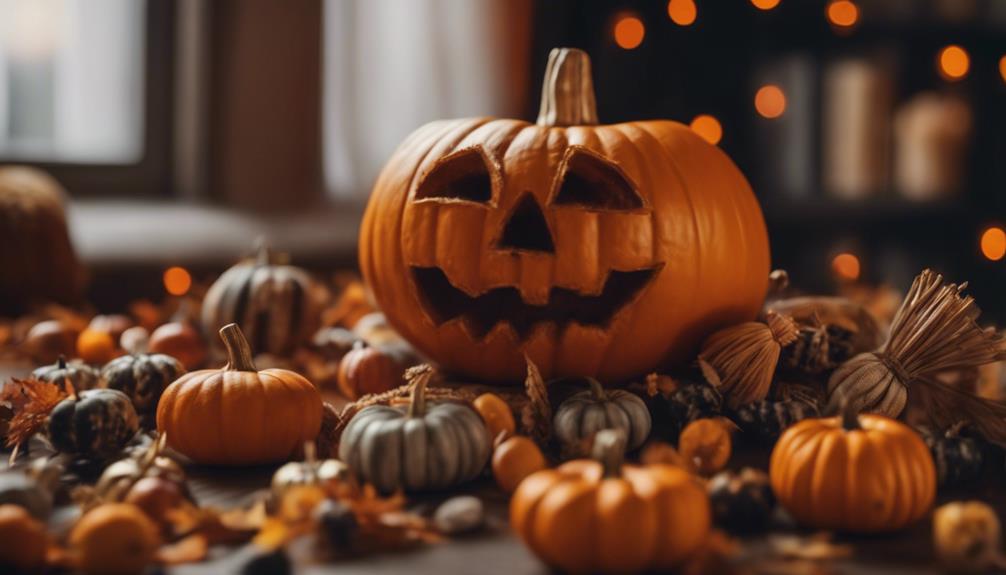
In Poland, Halloween isn't typically celebrated. Instead, the country honors All Saints Day and All Souls Day in late October and early November with grave visits, candles, and prayers to remember and pay respects to the departed. While some Polish families host Halloween-themed parties, the focus remains on traditional customs and spiritual reflection, fostering community connections and a reverent atmosphere in cemeteries. The debate between embracing Western Halloween traditions or preserving Polish heritage continues in Poland, shaping the future of Halloween observances in the country. Curious to know more about Halloween traditions in Poland?
Key Takeaways
- Poland traditionally focuses on All Saints Day
- All Saints Day emphasizes remembrance and respect
- Halloween not traditionally celebrated in Poland
- Some Polish youth are beginning to adopt Halloween practices
- Ongoing debates in Poland about embracing Halloween or preserving customs
Overview of Halloween in Poland
When looking at the Overview of Halloween in Poland, it becomes clear that the country maintains its own unique traditions that differ from the Western celebration of Halloween.
While Halloween isn't traditionally celebrated in Poland, the focus shifts to a significant holiday known as All Saints Day. This day holds great importance in Polish culture, emphasizing remembrance and respect for deceased loved ones. Unlike the commercialized aspects of Halloween, All Saints Day in Poland is a time for families to visit cemeteries, light candles, and lay flowers on the graves of their ancestors. This tradition fosters a sense of connection with the past and a deep respect for those who've passed on.
As a result, the debate in Poland often centers around whether to embrace Halloween as a cultural import or continue to preserve the rich customs associated with All Saints Day. Pumpkins, typically linked to Halloween, aren't a traditional element of Polish celebrations, further highlighting the distinctiveness of Poland's approach to this time of year.
All Saints Day Traditions in Poland
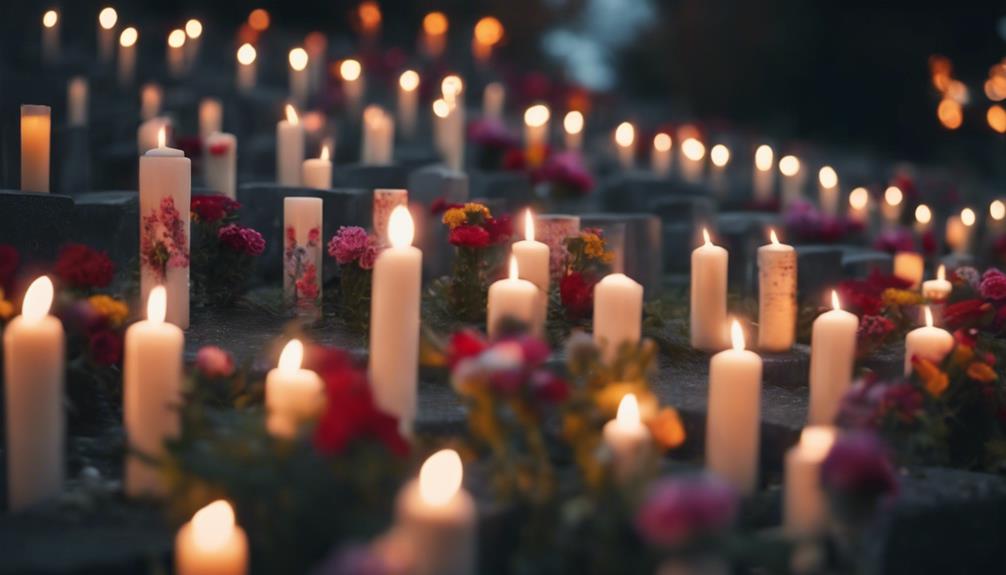
During All Saints Day in Poland, locals partake in the tradition of lighting grave candles, adorning graves with vibrant chrysanthemums, and attending church prayer services. These customs are a heartfelt way to honor deceased loved ones and create a spiritual connection between the living and the departed.
Embracing the solemnity of the occasion, many visit family graves to reflect, pray, and pay their respects.
Candle-Lit Grave Visits
Millions of grave candles, known as zniczy, illuminate the solemn beauty of All Saints Day in Poland, symbolizing the divine presence and honoring departed loved ones through traditional rituals. The flickering glow of these candles creates a mesmerizing sight across cemeteries, where families gather to pay homage to their ancestors.
Alongside the radiant zniczy, colorful chrysanthemums adorn gravestones, adding a touch of vibrancy to the peaceful surroundings. The tradition of candle-lit grave visits is deeply ingrained in Polish culture, fostering a sense of community and respect for the deceased.
During All Saints Day, the atmosphere is one of spiritual contemplation, prayer, and reflection on the lives of those who've passed on. This tradition not only honors the memory of loved ones but also serves as a reminder of the importance of family ties and the continuity of generations.
The act of lighting candles and decorating graves is a poignant way to connect with the past and embrace the present.
Floral Wreath Offerings
Floral wreaths, commonly made with chrysanthemums symbolizing death and rebirth, are a traditional offering during All Saints Day in Poland. Families honor their departed relatives by placing these wreaths on graves, creating a beautiful and solemn atmosphere in cemeteries. The vibrant colors of the wreaths stand out against the backdrop of the graves, symbolizing remembrance, respect, and the eternal cycle of life and death in Polish traditions. Here is a visual representation of the significance of floral wreaths during All Saints Day:
| Symbolism | Description |
|---|---|
| Chrysanthemums | Represent death and rebirth |
| Colors | Signify remembrance and respect |
| Placement | On graves of deceased loved ones |
| Tradition | Enhances the beauty of cemeteries |
These floral tributes play an essential role in the observance of All Saints Day, illustrating the deep-rooted customs and reverence for the deceased in Polish culture.
Church Prayer Services
Church prayer services hold a central role in the rich tapestry of All Saints Day traditions observed in Poland. On this day, many Polish families gather in churches to attend these solemn services, where they honor and remember their deceased loved ones.
The prayers offered during these church services are a way to seek blessings for the souls of the departed and to reflect on the lives they lived. The religious significance of All Saints Day is profoundly emphasized through these special prayers and blessings, creating a sense of spiritual connection and community among the attendees.
These church prayer services not only serve as a time for personal reflection and remembrance but also contribute to the communal aspect of the tradition, bringing people together in unity and shared reverence for the departed. Through these services, the essence of All Saints Day is deeply rooted in faith, tradition, and the collective memory of those who've passed on.
All Souls Day Observances
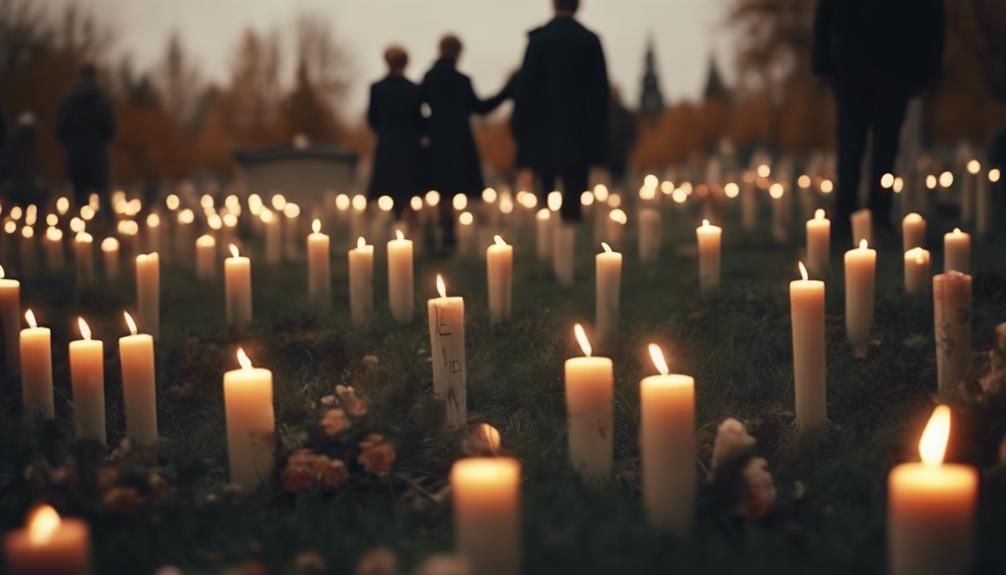
On November 2nd in Poland, families gather at cemeteries to remember and pray for the souls of the departed during All Souls Day observances. This day holds great significance as it allows people to honor and reflect on their deceased loved ones.
It's a deeply rooted tradition where families visit the graves of relatives, light candles, and decorate the burial sites with flowers. All Souls Day emphasizes the spiritual connection between the living and the deceased, fostering a sense of unity and remembrance within the community.
It serves as a time for both personal reflection and collective mourning, bringing families together to pay respects to those who've passed away. Through these observances, individuals express their love and respect for the departed souls while finding solace in the shared experience of commemorating their lives.
Contrasting Halloween and Polish Customs
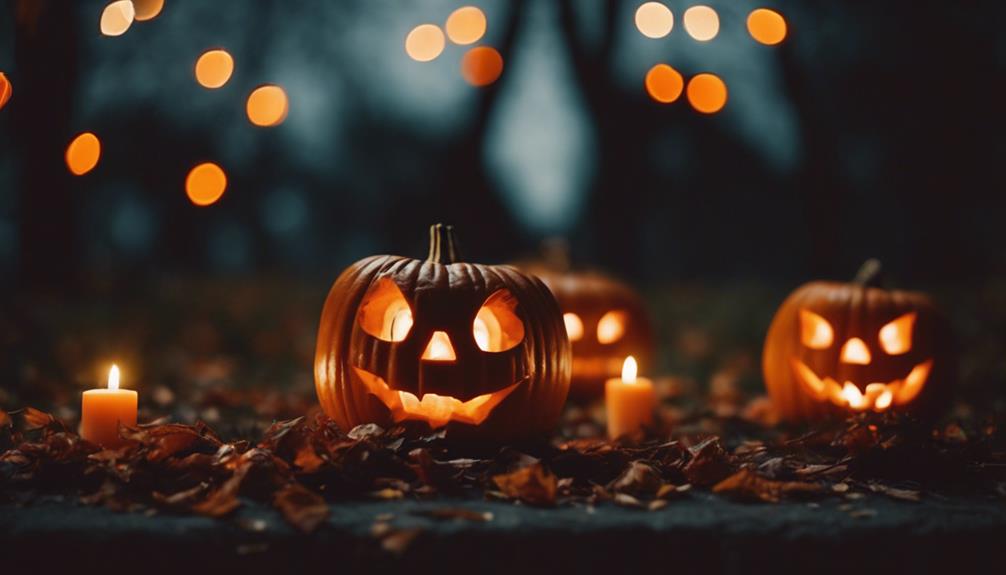
Contrasting with the commercialized and spooky nature of Halloween, Polish customs surrounding All Saints Day focus on spiritual reflection and honoring ancestors. In Poland, All Saints Day is a solemn occasion where millions of grave candles, known as zniczy, are lit, and colorful chrysanthemums adorn gravestones.
This tradition places a strong emphasis on remembering loved ones and coming together as a community to pay respects. Unlike Halloween, which often revolves around costumes and candy, All Saints Day in Poland is about creating a meaningful and reverent atmosphere in cemeteries. These places are seen as beautiful and spiritually significant, fostering a sense of connection with departed ancestors.
The Polish customs during All Saints Day stand in stark contrast to the more commercialized and lighthearted nature of Halloween, highlighting the importance of reflection, remembrance, and honoring the past.
Influence of Western Culture on Poland
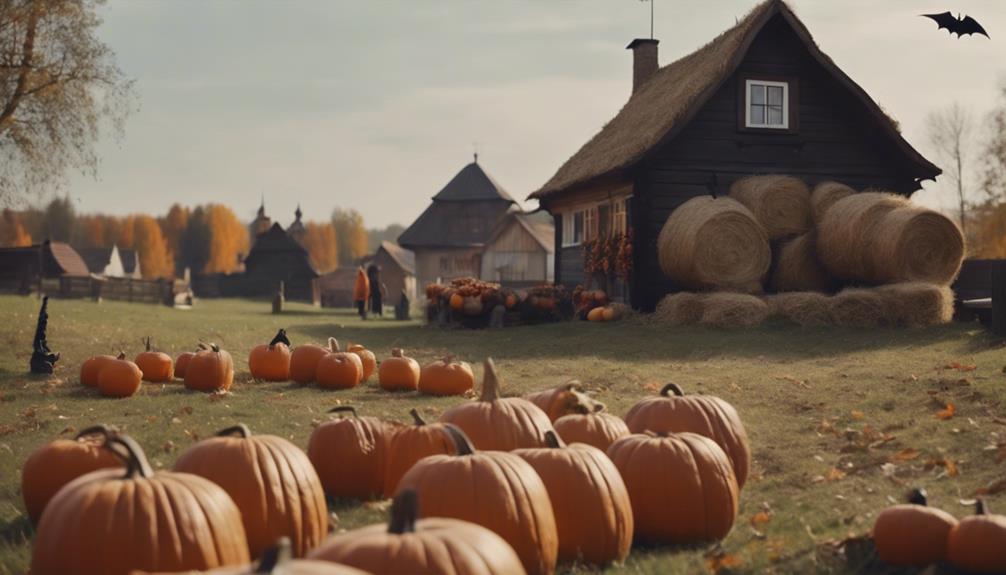
Western culture has had a noticeable impact on Poland, influencing how traditions like Halloween are celebrated. Polish society has adapted to incorporate elements of Western culture, seen in the growing popularity of Halloween-themed events and parties.
This exchange of cultural practices reflects a broader trend of globalization and the merging of traditions from different parts of the world.
Western Cultural Impact
The influence of Western culture on Poland is evident through the adoption of Halloween practices such as costume parties and decorations. Media exposure and the presence of international schools in Poland play significant roles in spreading Western Halloween traditions across the country.
As a result, some Polish families now host Halloween parties for children, showcasing the integration of Western customs into Polish society. Additionally, discussions about Halloween in primary schools during English lessons further highlight the impact of Western culture on the younger generation in Poland.
The popularity of Halloween-themed events and decorations in shopping malls and English schools also demonstrates how deeply Western culture has influenced Poland. Overall, the Western cultural impact on Poland, particularly in the domain of Halloween celebrations, is notable and continues to shape the cultural landscape of the country.
Polish Traditions Adaptation
Amidst the increasing prevalence of Halloween-themed practices in Poland, a significant transformation in traditional customs is becoming apparent. Western influence has led to the adaptation of Halloween-themed parties, especially among the youth in Poland.
While traditional trick-or-treating isn't common, some children are introducing the practice in neighborhoods. Halloween is now widely discussed in Polish primary schools during English lessons, indicating its growing presence in the country.
Polish farmers have even started producing pumpkins, which are becoming more popular in shopping malls and English schools due to Halloween influence. There's an ongoing discussion in Poland regarding the adaptation of Halloween practices while balancing them with traditional Polish customs.
This adaptation of traditions brings a mix of Western culture into Poland, blending it with the country's rich heritage. As these changes continue to evolve, it will be interesting to see how Polish traditions adapt further to incorporate Halloween practices.
Polish Views on Halloween Celebrations
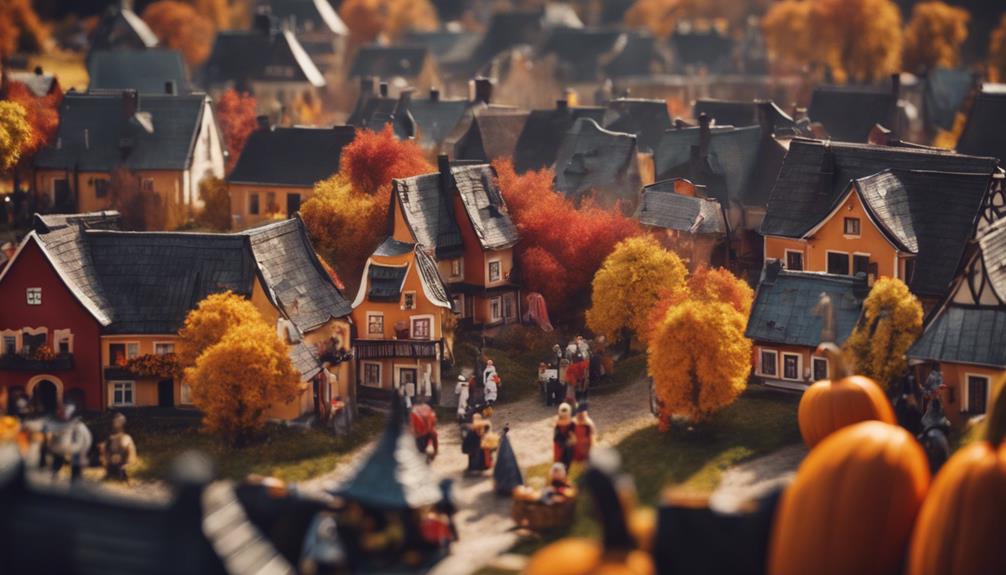
While traditionally not a widely embraced holiday in Poland, Halloween celebrations have been gaining popularity, particularly among the younger generation. In Poland, the focus during late October and early November tends to be on All Saints Day and All Souls Day, deeply rooted in Polish traditions and customs.
However, influenced by Western culture, Halloween has made its way into Polish society, sparking varied views on the holiday. Some Polish families now host Halloween-themed parties, blending modern festivities with traditional practices. There are ongoing debates among Poles about whether to fully embrace American Halloween traditions or to uphold their own cultural heritage.
The discussions often revolve around finding a balance between modern celebrations and preserving Polish values. As a result, Polish views on Halloween celebrations range from enthusiastic participation to skepticism about the holiday's cultural significance. The evolving attitudes towards Halloween reflect a generational shift and the influence of global trends on Polish society.
Community Practices During October-November

Community observances in Poland during October-November revolve around honoring departed loved ones through traditional rituals and gatherings. This time is especially significant due to the observance of All Saints Day, a solemn occasion where families come together to pay their respects to those who've passed away. Here are some key practices during this period:
- Families gather at cemeteries to remember their deceased loved ones.
- Candles, known as zniczy, are lit on graves to symbolize the presence of God.
- Polish cemeteries are adorned with vibrant chrysanthemums and illuminated for a reverent atmosphere.
- Millions of candles are lit across the country during this time, creating a solemn ambiance.
- The atmosphere in Poland during October-November is one of spiritual contemplation and reflection, focusing on honoring and remembering ancestors.
These practices highlight the importance of family, tradition, and remembrance in Polish culture during this time of the year.
Future of Halloween in Polish Culture
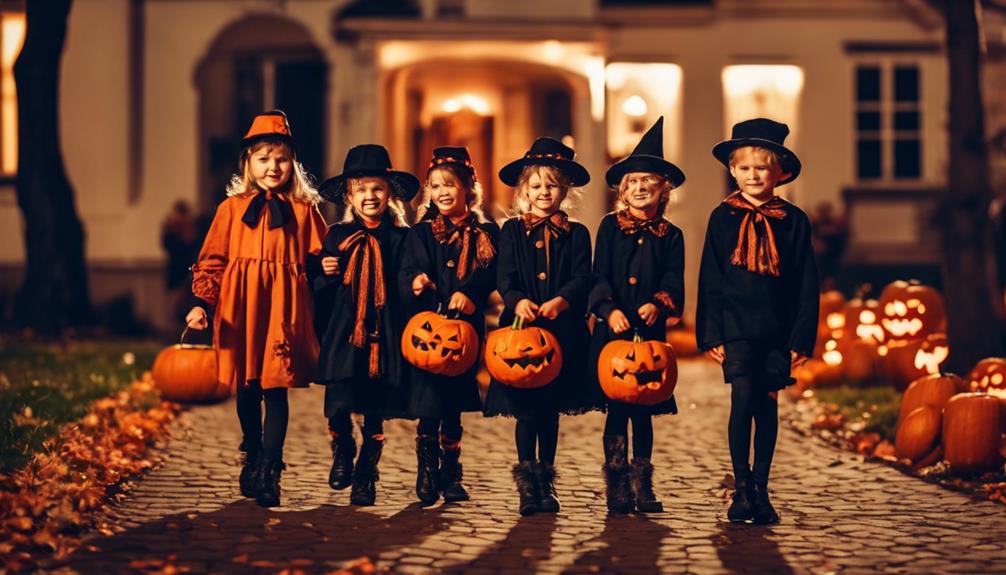
The evolving landscape of Polish culture sees a growing influence of Halloween practices among the youth, sparking debates on the preservation of traditional customs. As Polish society continues to evolve, the future of Halloween in Polish culture remains uncertain. The increasing popularity of Halloween-themed parties and activities among the younger generation reflects a shift towards embracing Western traditions. This trend has led to discussions within the community about whether to adapt to these new practices or uphold longstanding Polish holiday traditions.
With mass media and Western cultural influences playing a significant role in shaping the spread of Halloween practices in Poland, the debate on the future of Halloween is likely to intensify. The introduction of trick-or-treating by some Polish children and the emergence of pumpkin production by local farmers indicate a gradual integration of Halloween into Polish society. Whether this trend will continue to grow, replacing or coexisting with traditional customs, remains to be seen as Poland navigates the intersection of its rich heritage and modern influences.
Frequently Asked Questions
Do Poland Celebrate Halloween?
In Poland, Halloween isn't traditionally celebrated. Instead, the focus lies on All Saints Day and All Souls Day, honoring ancestors with candle lighting and grave decorations.
This contrasts with the commercialized nature of Halloween. The atmosphere during All Saints Day is solemn and deeply rooted in Christian beliefs.
What Is the Polish Version of Halloween?
The Polish version of Halloween is known as Dziady. It's a traditional feast that blends pagan folk rituals with Christian beliefs.
Dziady involves offerings of food and lighting fires to honor deceased ancestors. Celebrated on November 1st, this event has specific rituals in various regions of Poland.
Deeply rooted in Polish cultural heritage, Dziady combines pagan and Christian customs in a significant cultural celebration.
What Is Dziady in Poland?
Dziady in Poland is a traditional celebration blending pagan and Christian customs. Offerings like milk, cake, and fruit are made during ceremonies to honor deceased ancestors. Participants wear Karaboshka masks to guide spirits back to the afterworld.
Feasting at burial grounds is also part of the tradition. These practices were observed in Polish regions until the early 20th century, showcasing the rich cultural heritage of the country.
What Country Is Halloween a Holiday?
Halloween is celebrated as a holiday in countries like the United States, Canada, Ireland, and the United Kingdom. It's known for costumes, trick-or-treating, and spooky decorations.
The holiday originated from ancient Celtic traditions and has evolved into a fun and festive occasion for children and adults alike. Many countries have adopted Halloween customs, making it a widely recognized celebration in various parts of the world.
Conclusion
As you explore the traditions of Halloween in Poland, you may find a unique blend of customs and beliefs that set it apart from the typical celebrations in other countries.
While Poland may not fully embrace the commercial aspects of Halloween, the observance of All Saints Day and All Souls Day offers a rich cultural experience.
Embrace the differences and appreciate the rich tapestry of traditions that make Poland's celebration of Halloween truly special.
Hello, I’m Damien, the editor-in-chief here at Halloween Product Reviews. As a lover of all things Halloween, my goal is to be your one-stop resource. Whether you’re seeking costumes, decorations, or just looking to embrace the festive spirit, our expert team is here to assist in making your Halloween truly spectacular. My personal joy comes from dressing up, decorating my home, and diving into the Halloween festivities. I’m here to help make your Halloween as spooky and fun as possible!
Halloween
Religions Which Do Not Celebrate Halloween
Peek into the diverse beliefs of religions like Jehovah's Witnesses and Seventh-day Adventists that abstain from Halloween celebrations for intriguing reasons.
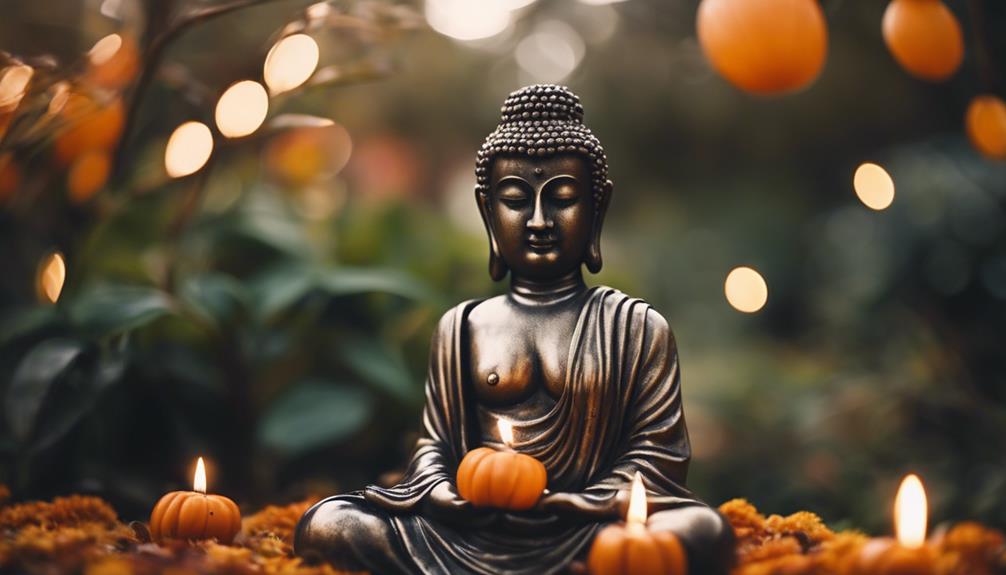
Jehovah's Witnesses, Seventh-day Adventists, Orthodox Judaism, Islam, and some Protestant denominations do not celebrate Halloween. Reasons include beliefs conflicting with pagan customs and prioritizing spiritual practices over secular festivities. Alternative events in line with their faith are organized. Buddhism and Hinduism do not specifically address Halloween, focusing on mindfulness, compassion, meditation, and Diwali as a significant Hindu festival. Southern Baptists also vary in views on Halloween, with some avoiding it due to beliefs. Various religions offer unique perspectives on Halloween celebrations, each rooted in their beliefs. Further insights into different religious practices are available in the detailed research.
Key Takeaways
- Jehovah's Witnesses abstain due to Halloween's pagan origins.
- Seventh-day Adventists avoid Halloween activities.
- Orthodox Judaism refrains from celebrating Halloween.
- Islam focuses on Eid and doesn't observe Halloween.
- Some Protestant denominations, like Southern Baptists, may reject Halloween celebrations.
Jehovah's Witnesses
Jehovah's Witnesses abstain from celebrating Halloween due to their belief that it's a pagan custom with no spiritual significance. For Jehovah's Witnesses, Halloween is considered a pagan holiday that isn't aligned with their religious beliefs. They view holidays like Halloween as closely tied to pagan customs and idolatry, which goes against their teachings.
Instead of partaking in Halloween festivities, Jehovah's Witnesses prioritize worship and spiritual activities that align with their faith. This means that they don't engage in Halloween traditions or celebrations, opting to distance themselves from what they perceive as pagan rituals.
Seventh-day Adventists

Concerned about superstition and the holiday's origins, Seventh-day Adventists don't participate in Halloween activities. Halloween isn't a religious observance in Seventh-day Adventist beliefs, and they prioritize spiritual practices, which may lead them to avoid Halloween due to its secular and potentially superstitious nature.
In accordance with their teachings, Seventh-day Adventists emphasize healthy living and steer clear of practices that contradict their faith, including Halloween celebrations. Instead of Halloween festivities, some Seventh-day Adventist churches may opt to organize alternative events like fall festivals or harvest celebrations that align more with their religious beliefs.
Orthodox Judaism
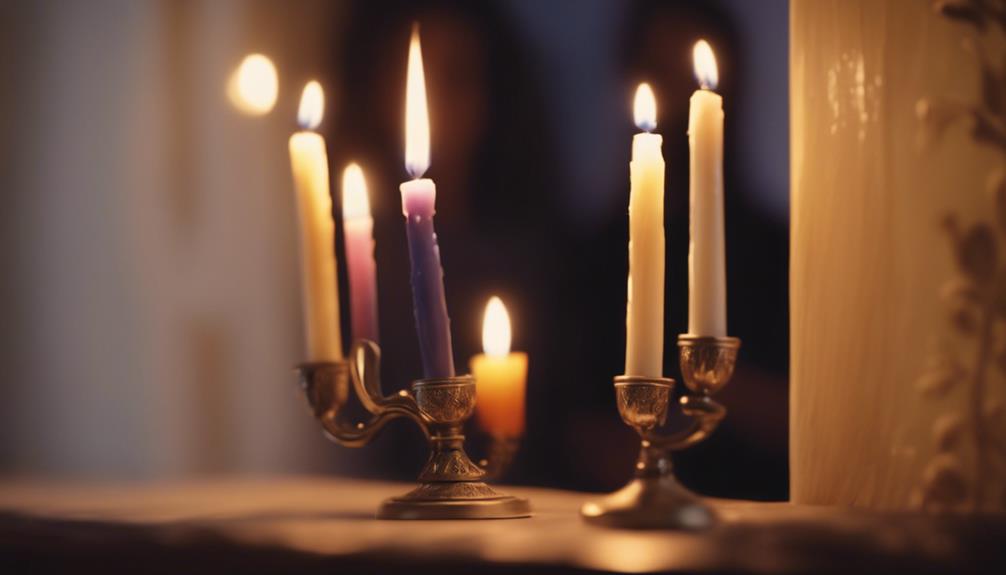
Orthodox Judaism refrains from celebrating Halloween due to its non-Jewish origins and pagan undertones. Orthodox Jews, adhering to their religious beliefs, avoid partaking in Halloween festivities.
This secular holiday, despite its religious roots dating back thousands of years, doesn't align with Orthodox Jewish traditions. Instead, Orthodox Judaism emphasizes Jewish holidays and customs over Halloween celebrations.
Some Orthodox Jews may choose to engage in alternative autumn-themed activities to mark the season without participating in Halloween-related events. The decision to abstain from Halloween activities stems from the values and principles upheld in Orthodox Jewish communities.
Islam
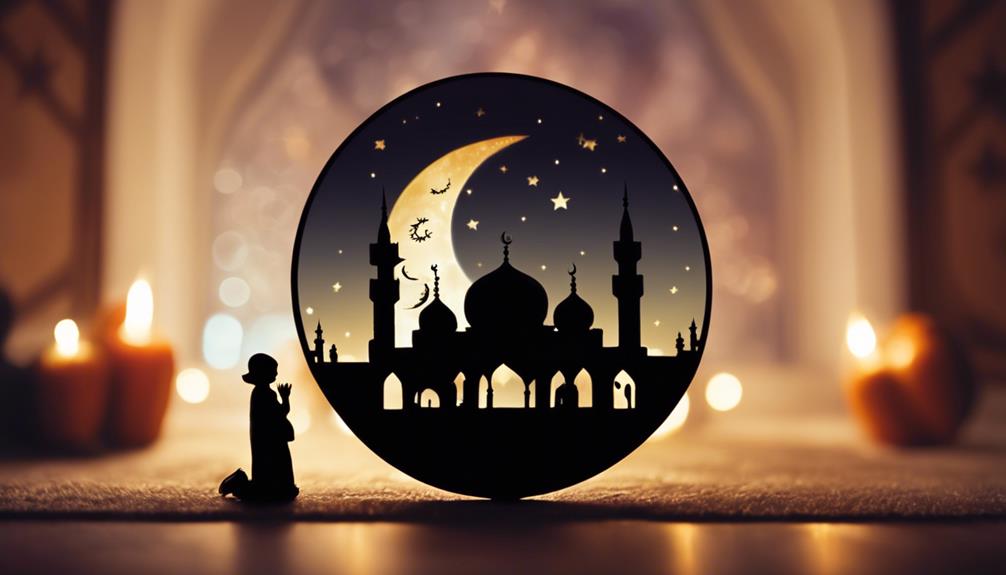
In Islam, the observance of Halloween isn't a common practice due to its pagan origins and lack of spiritual significance within the faith. Halloween is considered a pagan holiday with no place in Islamic customs. Many Muslims don't participate in Halloween festivities due to concerns that it promotes mischief rather than moral values.
The focus in Islam is on the celebration of the two annual holidays, Eid al-Fitr and Eid al-Adha, which hold deep religious significance. As a result, the majority of Muslims choose not to partake in Halloween activities. Instead, some may opt for alternative autumn-themed celebrations or simply focus on the Islamic holidays that are integral to their faith.
The decision to refrain from Halloween is rooted in the desire to uphold Islamic beliefs and values, steering clear of practices that are viewed as contradictory to the teachings of Islam.
Certain Protestant Christian Denominations
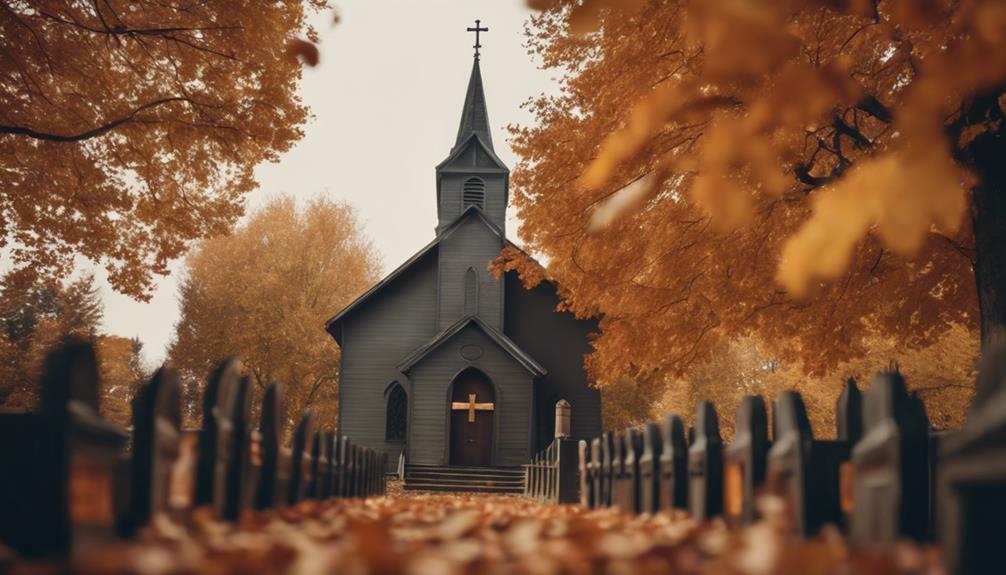
Certain Protestant Christian denominations exhibit varying perspectives on the observance of Halloween, reflecting a spectrum of views within the faith community. When it comes to Halloween festivities, religious groups within Protestantism may take different stances:
- Some Baptist churches reject Halloween due to its pagan origins and association with superstitions.
- Southern Baptists, known for their conservative stance, often avoid celebrating Halloween.
- Protestant schools may discourage Halloween celebrations through informational packets sent to parents.
- Certain Protestant denominations prioritize religious holidays over Halloween festivities.
- The views on Halloween within Protestant Christian denominations can vary widely.
Within Protestantism, the approach to Halloween can be influenced by theological beliefs, cultural considerations, and individual interpretations of scripture. It's important to recognize that there's diversity in how different denominations navigate the question of participating in Halloween activities, with some choosing to abstain while others may find ways to engage with the holiday in a manner consistent with their faith.
Buddhism
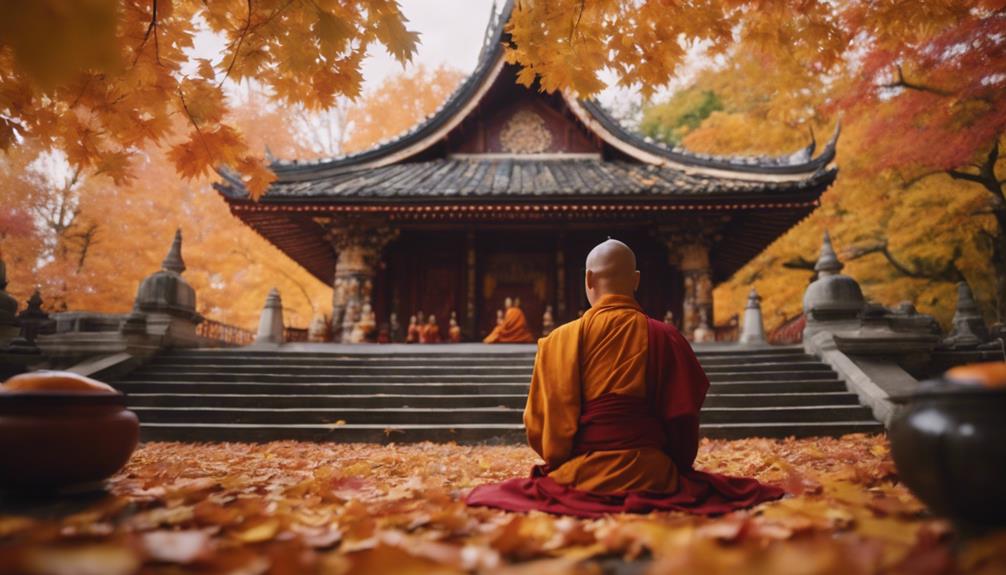
Wondering how Buddhism views Halloween celebrations?
Buddhism doesn't have a specific stance on Halloween as it isn't a traditional Buddhist holiday. Some Buddhist practitioners may choose not to celebrate Halloween due to its Western cultural origins. Instead of external celebrations like Halloween, Buddhism focuses on mindfulness, compassion, and inner reflection.
Buddhist teachings emphasize the impermanence of life and the importance of cultivating positive qualities. During the fall season, Buddhist communities may engage in meditation retreats or spiritual practices rather than participating in Halloween festivities. Since Halloween isn't a significant holiday within Buddhism, followers typically don't actively celebrate the holiday.
The focus remains on personal growth, self-awareness, and spiritual development, aligning with the core principles of the Buddhist faith. This approach highlights the internal journey of individuals rather than external observances of a fall festival like Halloween.
Hinduism
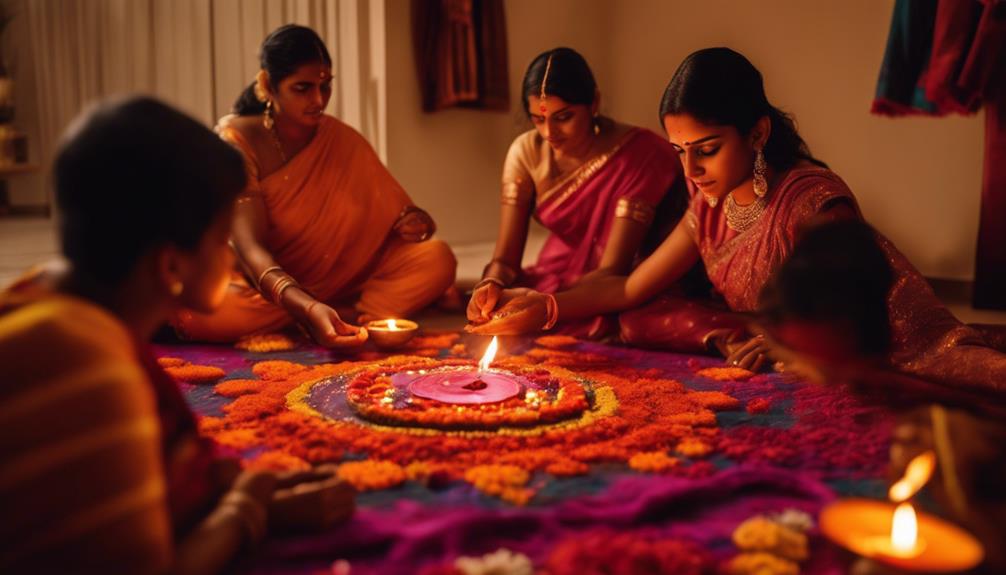
Considering the rich tradition of celebrations in Hinduism, Diwali stands out as a significant festival known as the Festival of Lights. During Diwali:
- Homes are adorned with colorful lights and candles, symbolizing the victory of light over darkness.
- Families come together for prayers and rituals, fostering a sense of unity and gratitude.
- Delicious sweets and treats are shared among loved ones, spreading joy and warmth.
- Exchanging gifts is a common practice, reflecting the spirit of giving and generosity.
- Fireworks light up the night sky, adding to the festive atmosphere and creating a sense of jubilation.
For many Hindus, Diwali holds deep cultural and religious significance, making it a time of reverence and celebration. The focus on light, goodness, and togetherness during Diwali often leads some Hindus to prioritize these traditional festivities over Halloween, opting for autumn-themed celebrations that align more closely with their beliefs.
Southern Baptists
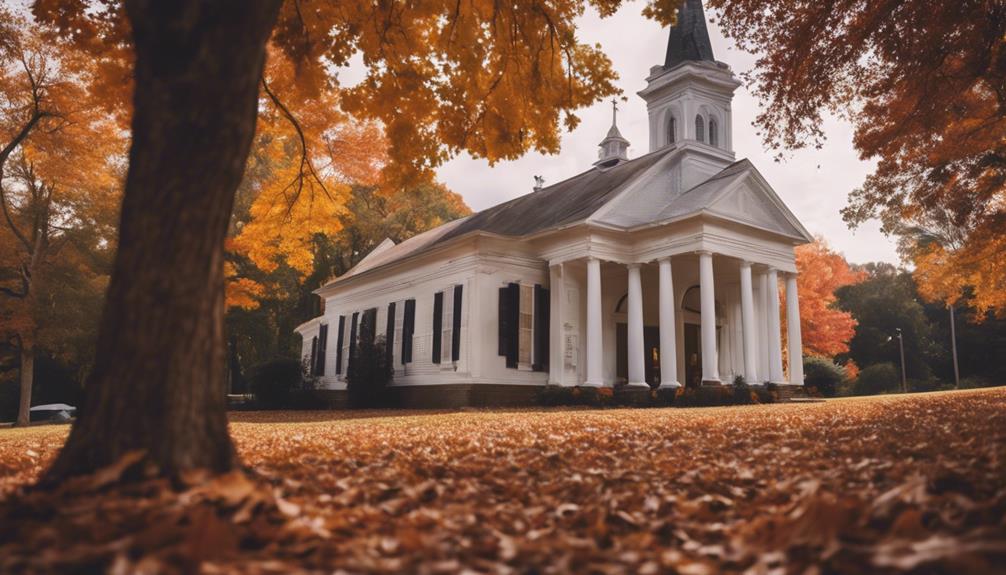
Southern Baptists, known for their conservative and fundamentalist beliefs, may hold varying perspectives on the celebration of Halloween. Some Baptist churches, including Southern Baptists, reject the observance of Halloween due to its perceived contradictions with their religious values. Within Southern Baptist communities, the view on Halloween can differ based on individual beliefs and teachings of the specific church.
It isn't uncommon for Southern Baptist schools to discourage or caution against participating in Halloween activities, citing concerns about the holiday's origins and associations with the occult. The conservative nature of Southern Baptist beliefs often leads to a cautious approach towards Halloween, with some members choosing to abstain from the festivities altogether. While not all Southern Baptists may completely reject Halloween, many approach the holiday with discernment and a desire to align their actions with their religious convictions.
Ultimately, the stance on Halloween within Southern Baptist circles can vary, reflecting the diversity of opinions and interpretations within this religious group.
Frequently Asked Questions
Do Muslims Not Celebrate Halloween?
Muslims don't celebrate Halloween due to its pagan origins and lack of spiritual significance. Some Muslims feel it promotes mischief over morals. Instead, Islamic holidays like Eid al-Fitr and Eid al-Adha are revered.
Most Muslims choose autumn-themed festivities or focus on Islamic celebrations. Halloween holds no place in traditional Muslim practices.
Do Jews Celebrate Halloween?
You might wonder if Jews celebrate Halloween. In general, Orthodox and Conservative Judaism avoid Halloween due to its pagan origins. Reform Judaism varies, with some schools shying away from the holiday.
While some Jewish families permit trick-or-treating, Halloween is typically not a big family celebration. Instead, Jewish communities may opt for alternative autumn-themed festivities to replace Halloween.
Where Does the Bible Say Not to Celebrate Halloween?
The Bible doesn't specifically mention Halloween, a modern holiday with pagan roots. However, Deuteronomy 12:31-32 cautions against adopting pagan customs. It's advised to avoid practices conflicting with faith.
Some interpret these principles as a reason not to celebrate Halloween. Personal biblical interpretations influence this decision.
Are Catholics Not Allowed to Celebrate Halloween?
You're allowed to celebrate Halloween as a Catholic, as long as it aligns with your faith and values. Some Catholics may choose to avoid traditions with pagan origins, but the Vatican hasn't officially prohibited Halloween celebrations.
Many Catholic parishes and schools host events focusing on fun and community. Ultimately, individual Catholics can decide how to approach Halloween based on personal beliefs and traditions.
Conclusion
To sum up, there are several religions that don't celebrate Halloween, such as Jehovah's Witnesses, Seventh-day Adventists, Orthodox Judaism, Islam, certain Protestant Christian denominations, Buddhism, Hinduism, and Southern Baptists.
Each of these faiths has its own beliefs and practices that guide their decision not to participate in this holiday.
Understanding and respecting these differences can help foster a sense of inclusivity and appreciation for the diverse cultural and religious traditions in our world.
Hi, I’m Absinthe. I help manage Halloween Product Reviews, the only website you’ll need for all your Halloween essentials. My favorite holiday is, undoubtedly, Halloween. I thrive on the spooky atmosphere, the creative costumes, and yes—the candy! I am always on the lookout for new and exciting ways to celebrate and share my discoveries to enhance your Halloween experience. Make sure to visit us, and I promise you’ll find something to make your Halloween unforgettable!
-

 Halloween1 month ago
Halloween1 month agoMga Tauhan ng Florante at Laura Costume
-

 Halloween1 month ago
Halloween1 month agoSexy Harry Potter Outfits For Halloween
-

 Halloween1 month ago
Halloween1 month agoA Child in a Hitler Costume Causes a Stir Online
-

 Halloween2 months ago
Halloween2 months agoCan You Go to Halloween Horror Nights While Pregnant?
-

 Halloween1 month ago
Halloween1 month agoAlvin and the Chipmunks Costume Ideas
-
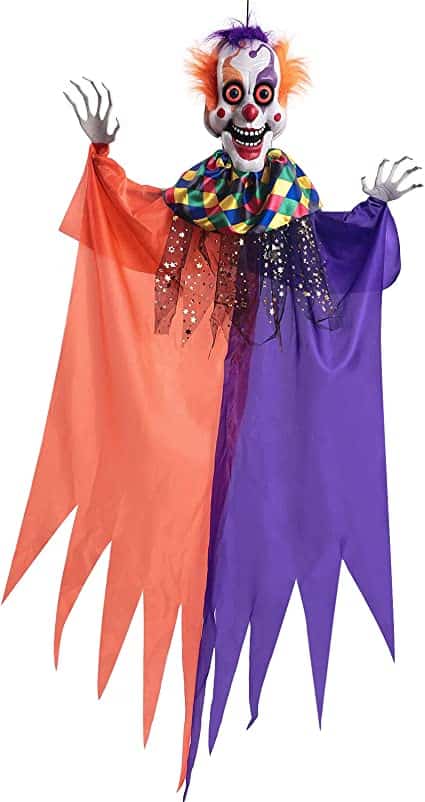
 Halloween1 month ago
Halloween1 month agoHow to Protect Halloween Animatronics From Rain
-

 Halloween1 month ago
Halloween1 month agoHow to Get Halloween Cookies in Cookie Clicker
-

 Halloween1 month ago
Halloween1 month agoWinx Club Costume For Adults




